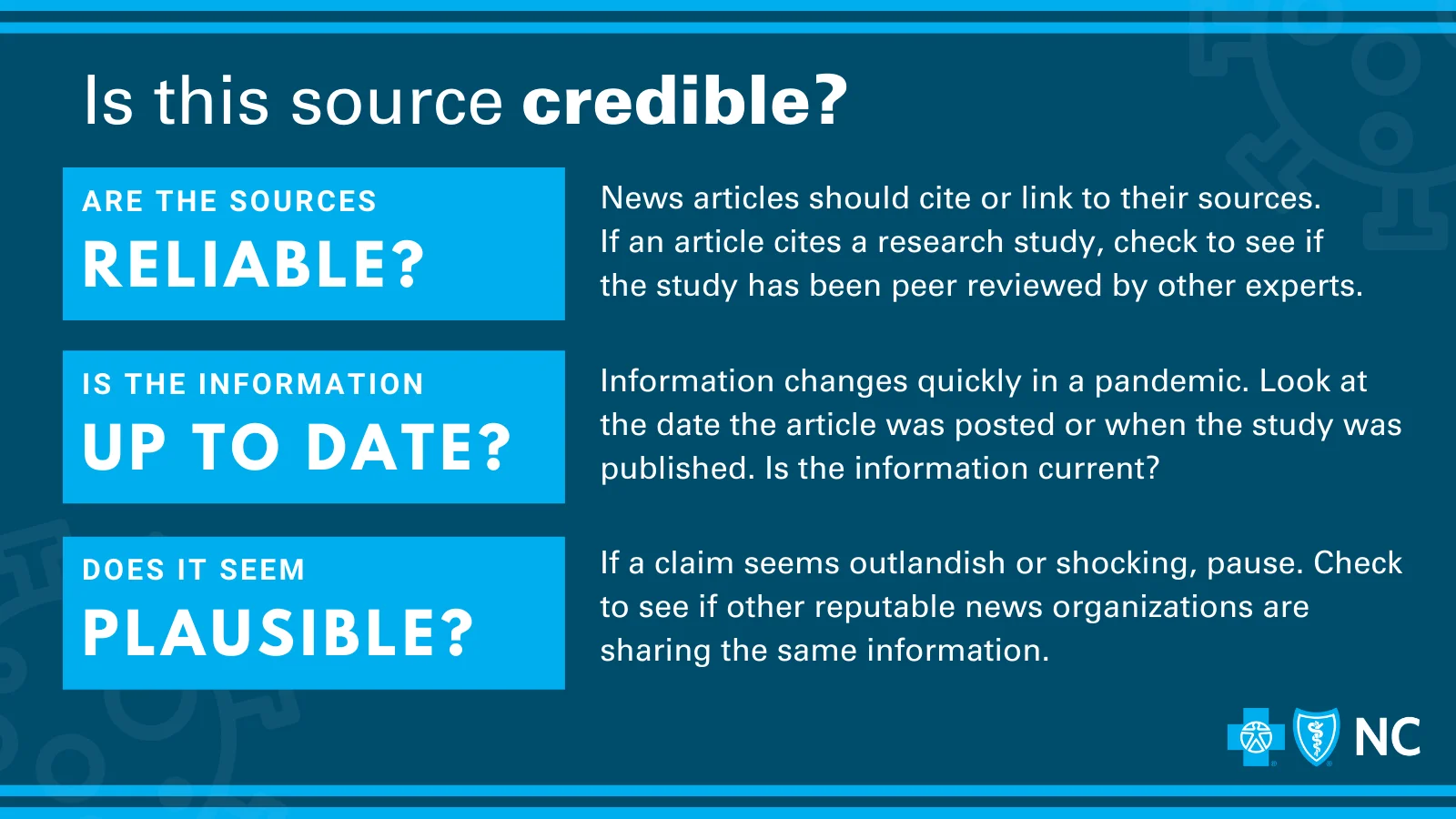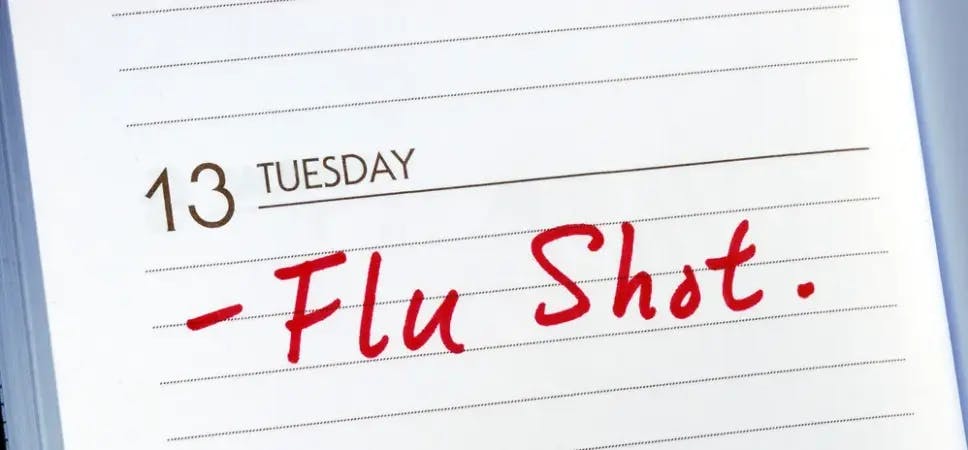
KNOWING THE DIFFERENCE BETWEEN FACT AND FICTION COULD SAVE LIVES.
The internet has given us access to information faster than ever. Unfortunately, that information is not always accurate. And the spread of misinformation has real consequences on our health care decisions.
In recent years, misinformation has proliferated throughout the internet. It can seem impossible to differentiate what is true and what isn’t. When COVID-19 arrived, public trust in institutions was already dwindling. That created the perfect storm for misinformation to spread, at a time when the difference between fact and fiction could save lives.
The World Health Organization has coined our current struggle with COVID-19 misinformation an “infodemic.” Here are a few tips on how to bolster your fact-checking skills and how to weed out COVID-19 misinformation.
Verify sources
If you see something that seems outrageous or too good to be true, it’s a good idea to pause. Check to see if the story verifies its sources and if those sources are trustworthy. If the story does not offer any sources, that is a clear red flag that this article is not to be trusted.
In regard to COVID-19, if the story cites a study as a source, do a cursory search to see if that study was peer reviewed. A peer reviewed article has been reviewed by other experts in the field before it was published. This helps ensure that the research is high quality.
When looking at studies, also check to make sure they were conducted in a controlled environment and focused on a large group of people.
If the article links back to .gov websites, the CDC or the World Health Organization, that information is scientifically verified and can be trusted.
Public trust in science is critical to moving past COVID-19 and returning to our normal lives. Making sure to check that articles are using confirmed facts is a vital tool in our fight against COVID-19.

Don’t rely on social media
A survey by Kings College London late last year showed that belief in COVID-19 conspiracy theories was especially high among people who get most of their information about the pandemic from social media.
This isn’t surprising. Social media companies push posts that have high engagement. That usually means posts that elicit strong reactions, both positive and negative, will show up on your feed. This is great at keeping your attention, and keeping you on their website longer, but not so great at giving you accurate information.
When you see an article making claims that seem shocking or outlandish, stop and carefully read to see if the article is legitimate. Phony articles are often crafted with brazen and misleading headlines, so don’t just read the headline. Oftentimes these articles are meant to quickly grab your attention and make you want to impulse like or share it. Taking a pause to read through the story closely is our best defense against the spread of misinformation.
If you are looking for high-quality news and fact-checked information, it’s probably best you look outside of your news feed.
Talk your doctor
With so much confusion surrounding everything COVID, a great place to go to clear up any questions regarding COVID-19 would be your doctor.
Throughout the pandemic, medical professionals have advocated for safe COVID-19 practices. They’ve worked to clear up false facts about COVID and the vaccines. During this time, doctors have been empowering their patients to employ a healthy bit of skepticism to the outrageous claims they read online. They are prepared to answer any question you may have and can present the facts to you in clear language.
Most physicians realize that now more than ever, it is difficult to know what is true and what is false. Write down any rumors or hearsay you may have run into online and bring it to your next doctor’s visit to discuss it with them.
Doctors are oftentimes the most trusted voices in their communities, and in this battle against misinformation, they should absolutely be utilized. With everyone voicing an opinion on what the best course of action should be, we should leave the fact-finding and debunking to the professionals.
Media literacy is a difficult skill to develop. But using these tips can help you weed out bogus stories and separate facts from fiction.
Now more than ever we must make sure that we are only relying on information that is verified and factual. That means taking a closer look at the articles we are sharing, making sure they are fact-checked and written by credible sources. It also means leaning on reliable resources, like doctors and medical professionals, who will point us in the right direction.
With these tips in mind, we can work to dispel misinformation surrounding COVID-19 and better inform ourselves and the people around us.
Want to learn more about health care insurance? The agent on this page can help-at no cost to you! Click the button below or fill out the easy form in the blue box in the upper right corner for more information.
Ready to get started?
Related Articles

Why I Chose To Get The COVID-19 Vaccine: One Army Doctor Speaks Out
Dr. Minogue has been practicing medicine for nearly 30 years. He is a medical director at Blue Cross and Blue Shield of North Carolina. He works part-time in the Durham Veteran Affairs Emergency Department. Dr. Minogue also serves in the Army Reserve as an emergency medicine doctor and a volunteer at Samaritan Health Center, a clinic for the underserved in our community.
As a health care professional, Dr. Minogue was one of the first North Carolinians vaccinated in December 2020. Here’s what he shared about his decision to get the COVID-19 vaccine.
Charlene Macielag via Blue Cross NC

No Flu For You: 5 Flu Shot Myths Debunked
Maybe you’re ready to go and are rushing to Target because they’re offering discounts to shoppers who get the flu shot as an incentive. Great! You know the importance of getting the flu shot, not just for yourself but for your loved ones, too.
But maybe you’re not so ready. Maybe you’ve heard something that’s swayed your opinion this year. Something that scared you or made you think twice. We get it. Every year rumors circulate about getting vaccinated, from the outlandish to the plausible. And it’s hard to know what’s true and what’s not, especially in this age of lightning fast communications.
Allison Bonner

3 Things You Need To Know About Breakthrough COVID-19 Infections
If you’re vaccinated, you might be worrying about whether your vaccine will hold up against the more contagious delta variant.
If you’re not vaccinated, you might be wondering why you should get vaccinated if you could get infected with COVID anyway.
via Blue Cross NC by Dr. Von Nguyen